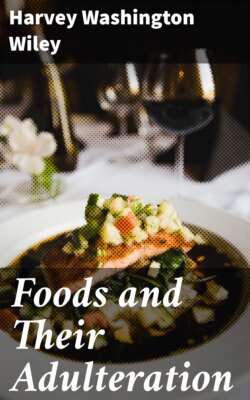Читать книгу Foods and Their Adulteration - Harvey Washington Wiley - Страница 151
На сайте Литреса книга снята с продажи.
Beef Tea.
Оглавление—A very common food preparation from beef is that known as beef tea. In all essential particulars beef tea is nothing more than a rich unfiltered soup stock. Inasmuch, however, as it is constantly prescribed in many kinds of illness and is prepared under certain conditions it should be mentioned specially here in addition to the preparations already described. As in the case of meat juice, beef tea should always be prepared in the home, and immediately before using. It is a preparation which can not be properly made and kept without the addition of some preservative which renders it totally unfit for human consumption. The very choicest portion of the beef should be selected in the preparation of beef tea and it should be reduced to a fine state of comminution. The removal of the fat and tendons should be as complete as possible, as particularly the latter tend to add to the extract more of the gelatine-like principles than is desirable. The fragments should be mixed with a sufficient quantity of cold water to make the desired amount of beef tea, usually one pound of water to a pound of comminuted beef is a good proportion. The mixture should be kept cold for a considerable length of time with frequent stirrings in order to extract as much as possible of the nitrogenous matter which becomes coagulated by heating. Salt may be used not only to promote the solubility but also to give the proper taste. After the lapse of an hour or more the vessel may be covered and gradually warmed. During this warming the mass should be frequently stirred so to as promote the solution. When finally the extraction is complete, before the tea is administered it should be cooked, that is, heated to the boiling-point, by which process the soluble protein is coagulated but not hardened, and the material is rendered more palatable. The beef tea should be administered without separating the coagulated fragments of albuminous material, which is in a state easily digestible, and adds much to the nutritive value of the mixture. Finally the residue of beef may be put into a bag and subjected to pressure to remove as much of the juice contained therein as possible. The difference between beef tea and soup stock, as will be seen, is largely in the filtering. The beef tea should retain the coagulated flocks, while in the soup stock they are removed. One pound of good lean beef and one pint of water yield about one-half pound of good beef tea. As in the case of soup stock, beef tea is not a very nutritive substance. It is, however, stimulating, and the nourishment which it contains is quickly absorbed. The soft, coagulated flocks of albumin are readily digested, and often a patient may be nourished for days on a preparation of this kind when he is in a condition which renders it impracticable to use either solid or other liquid foods.
Beef tea is also made on a large commercial scale and with some degree of approximation to the home prepared article. For various reasons, however, which have already been advanced, a well made domestic beef tea which can be used as soon as prepared is to be preferred in all cases to the manufactured article. A beef tea properly made contains approximately the following composition:
| Water, | 88.00 | percent |
| Meat bases, | 3.50 | „ |
| Protein—soluble and flocculated, | 8.00 | „ |
| Ash and salt, | 1.50 | „ |
